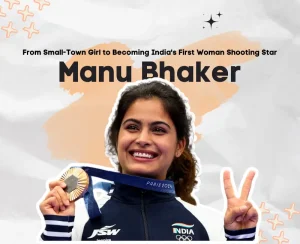The Inspiring Journey of Geeta Phogat – India’s First Female Wrestling Star

In the history of Indian sports, a handful of athletes have not just won medals but have fundamentally changed the game. Geeta Phogat is one of them. She is a name synonymous with grit, determination, and a quiet revolution.
She was the first Indian woman to earn a gold medal in wrestling at the Commonwealth Games in 2010 and to qualify for the Olympics in London (2012). She was a trailblazer from a small hamlet in Haryana.
Guided by her father, Mahavir Singh Phogat, she defied deeply entrenched societal norms, proving that a woman’s strength and resilience can not only conquer a male-dominated sport but can also inspire a generation to break free from tradition.
Her story, which earned her the prestigious 2012 Arjuna Award, is a powerful testament to the fact that success and spirit know no gender.
A Humble Beginning in a Challenging Landscape
Geeta was born in Balali village in the Bhiwani region of Haryana on December 15, 1988, and her life was everything from simple. Haryana is a state with a deeply patriarchal culture, where the birth of a girl child is often not celebrated.
The idea of a girl pursuing a sport like wrestling, which was considered a male-only domain, was unheard of and often met with strong opposition.
Geeta and her sisters grew up under the strict tutelage of their father, Mahavir Singh Phogat. A former wrestler himself, Mahavir saw the potential in his daughters and was determined to train them for wrestling.
He faced immense pressure and criticism from his community, who mocked him for “ruining” his daughters’ lives and for defying social norms.
However, Mahavir was unyielding in his belief that his daughters could achieve greatness. He built a wrestling akhada (training center) in their home and subjected them to a rigorous training regimen that was no different from that of a male wrestler.
This early training, marked by extreme discipline and dedication, laid the foundation for Geeta’s future success.
She learned to ignore the taunts and criticism and focus on her training. This mental fortitude, combined with her physical strength, would become her greatest asset on the mat.
A Father’s Radical Vision and a Daughter’s Discipline
Geeta Phogat’s destiny was inextricably linked to her father, Mahavir Singh Phogat. A former wrestler & a Dronacharya Award recipient, Mahavir’s wrestling career had ended without the glory he had dreamed of, an international medal for his country.
His unfulfilled ambition became his driving force, but his approach was radical and deeply controversial: he would train his daughters to achieve what he could not.
The decision was met with scorn and ridicule. Neighbours and relatives accused him of disgracing his family and village.
The idea of girls wearing shorts, cutting their hair short, and grappling in the mud with boys was seen as a grave defiance of traditional gender roles. However, Mahavir remained resolute.
He built a makeshift akhara (wrestling ring) on his land and began a rigorous training regimen that was brutal by any standards. Geeta and her sister, Babita, were woken up before dawn for a grueling routine of running, push-ups, squats, and hours of grappling.
Mahavir’s methods were unorthodox and often severe. He pushed his daughters to their physical and mental limits, believing that only through such rigorous discipline could they build the strength and resilience needed to compete at a professional level. He trained them to be as strong, if not stronger, than their male counterparts.
This unwavering discipline, instilled from a young age, became the bedrock of Geeta’s success. She learned to ignore the whispers and criticisms and instead channel her energy into perfecting her technique and building her stamina.
This foundation was her secret weapon, setting her apart from others and preparing her for the global stage.
The Making of a Wrestling Champion
The grueling training sessions in Balali were not in vain. Geeta and her sisters quickly began to dominate local and regional wrestling competitions, their victories a powerful counter-narrative to the prevailing skepticism. Their success was an affront to the male ego and a cause for immense pride for their father.
Word of the “Phogat sisters” began to spread, their reputation as formidable opponents growing with each tournament. Their journey from a small village akhara to the national wrestling scene was a swift and inspiring one, fueled by a ferocious appetite for victory.
A Timeline of Triumph
Geeta’s talent began to shine through in state and national tournaments, where her dominance became increasingly evident. Each victory was a small but significant blow against the societal norms that sought to hold her back.
Her first major international breakthrough came in 2009 at the Commonwealth Wrestling Championship in Jalandhar, Punjab.
At this event, she clinched a gold medal in the 55 kg freestyle category, a victory that, while often overshadowed by her later achievements, was a crucial milestone. It proved that a girl from a remote village in Haryana could compete and win against the best in the world.
This triumph set the stage for her most iconic moment. Her career trajectory from that point on was one of continuous ascent, with each tournament preparing her for the ultimate test of skill and nerve.
She was not just a competitor; she was a pioneer, a symbol of hope for every young girl who saw in her a path to a different life.
A Historic Victory at the 2010 Commonwealth Games
The year was 2010. The event was the Commonwealth Games in Delhi, held on Indian soil. The weight of a billion expectations rested on the shoulders of the Indian athletes.
For Geeta Phogat, this was the moment she had been training for her entire life. It was the culmination of years of sacrifice, struggle, and unwavering faith.
The crowd roared with anticipation as she stepped onto the mat for the final match in the 55 kg freestyle wrestling category. Her opponent was Emily Bensted from Australia, a formidable foe. The stakes were incredibly high.
The atmosphere in the stadium was electric. In stark contrast to the nail-biting, dramatic final portrayed in the movie Dangal, Geeta’s real-life victory was a display of sheer dominance.
She won the match in two straight periods, with a decisive score of 1-0, 7-0. She did not need a cinematic five-pointer in the final seconds; her victory was swift, clinical, and total.
When the referee raised her hand in victory, it was a moment of national pride, a watershed event that broke the glass ceiling for Indian women’s wrestling.
The match was a fierce battle of wills, a physical and mental contest that tested every ounce of strength and skill Geeta had acquired.
In the end, her relentless determination and superior technique prevailed. The final whistle blew, & the cheers of the crowd erupted into a thunderous ovation. Geeta Phogat had done it.
She had won the gold medal, a historic first for an Indian female wrestler in the Commonwealth Games. The sight of her standing on the podium, with the gold medal around her neck and the Indian flag rising high, was a moment of immense pride for the entire nation.
This victory was a turning point, a watershed moment for women’s wrestling in India. It was no longer a sport for men; a woman had proven that it was a sport for champions.
Geeta’s gold medal shattered stereotypes and opened the door for countless other girls to pursue their dreams in wrestling. It gave credibility to her father’s controversial methods and proved that his vision was not just a pipe dream but a revolutionary idea that had borne fruit.
The Commonwealth Games gold was the moment that the world finally recognized the power and potential of female athletes from India, and it was a moment that would inspire a whole new generation of champions to follow in her footsteps.
This victory was a public validation of a private struggle, a moment that proved that a woman’s strength was not something to be feared but something to be celebrated.
International Success and Continued Dominance
Geeta’s Commonwealth Games gold was just the beginning. In 2012, she became the first Indian female wrestler to qualify for the London Olympics.
Though she did not win a medal, her participation was a milestone that encouraged many young girls to pursue wrestling. That same year, she earned a bronze at the World Wrestling Championships, a rare achievement for an Indian wrestler.
She went on to win silver at the 2013 Asian Wrestling Championships and bronze at the 2015 edition, establishing herself as a consistent and formidable competitor.
The Phogat Sisters
For her sisters and other young ladies in her neighborhood, Geeta’s accomplishment paved the way. Babita Kumari and Ritu Phogat, her younger sisters, also became successful international wrestlers who brought honor to their country by winning medals.
The Phogat family came to represent female empowerment and to demonstrate that women can accomplish anything given the right encouragement and education.
The story of the Phogat sisters was so inspiring that it was made into a blockbuster Bollywood film, “Dangal.”
The Dangal Effect
If the Commonwealth Games victory made Geeta Phogat a national icon, the 2016 film Dangal transformed her into a global inspiration. The film, starring superstar Aamir Khan as her father, Mahavir Singh Phogat, and actress Fatima Sana Shaikh as Geeta, brought her life story to a worldwide audience.
Dangal was a cultural phenomenon that resonated deeply with people from all walks of life. It was a poignant and powerful portrayal of a father’s struggle, a daughter’s sacrifice, and a family’s unwavering dedication to a singular goal.
The film meticulously showcased the intense training, the societal resistance, and the fierce family bond that shaped Geeta’s life. It highlighted the immense sacrifices made by her father and her sister Babita, who was a constant source of support and a sparring partner.
The movie’s success brought unprecedented fame and recognition to the Phogat family. For Geeta, it meant that her story, once confined to wrestling circles, was now a source of inspiration for millions. She became a household name, a symbol of determination and female empowerment.
Fact vs. Fiction
While the film Dangal brought Geeta Phogat’s inspiring story to a global audience, it’s important to distinguish between cinematic narrative and reality. The movie was a brilliant piece of filmmaking, but it took creative liberties to enhance the drama.
- The Fictional Villain: The movie introduces a villainous coach at the National Sports Academy who tries to undermine Geeta’s training and sideline her father. In reality, no such coach existed. Geeta trained under esteemed and supportive coaches, including O.P. Yadav and Ryan Dobo, who helped her hone her skills.
- The Exaggerated Final Match: As mentioned earlier, the final match in the movie was a tense, three-round cliffhanger with Mahavir locked in a room. In reality, Geeta’s victory was a decisive two-period win, and her father was very much present in the stands, cheering her on.
- Pre-Commonwealth Success: The movie shows Geeta struggling to win any major tournament before the Commonwealth Games. It was omitted for dramatic effect, but in fact, she had already won a gold medal at the 2009 Commonwealth Wrestling Championship.
Despite these changes, Geeta herself has stated that 99% of the film is true to her life, particularly the core message of her father’s vision and the immense struggles she faced. The movie successfully captured the spirit of her story, introducing millions to the world of women’s wrestling and the power of a dream.
An Enduring Legacy
Geeta’s influence extends far beyond her achievements on the wrestling mat. She has become an advocate for women’s rights and a powerful voice against gender discrimination.
She often speaks at events, encouraging young girls to pursue their dreams and challenging societal norms that limit their potential.
Her journey has shown the world that with dedication and a supportive family, even the most deeply ingrained social barriers can be broken. She has proven that sports can be a vehicle for social change and empowerment.
Personal Life
In 2016, Geeta married fellow wrestler Pawan Kumar, and the couple welcomed their first child in 2019. Balancing personal and professional life, she continues to remain a role model for young women who aspire to excel in sports while embracing their personal lives.
Conclusion
Geeta Phogat’s journey from a small village to the world stage is a story of courage and determination. She is not just a wrestler but a pioneer who broke barriers and showed that girls can achieve greatness with the proper support. Her victory was not only her own but a win for every girl who dreams beyond tradition. Geeta’s legacy inspires us to believe in ourselves and never give up.


